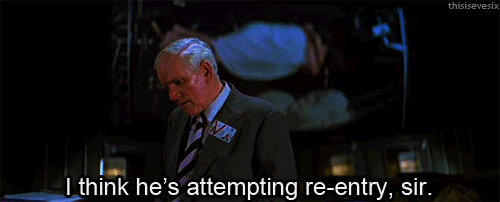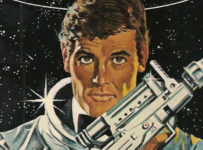Bond. James Bond. Is there a name more synonymous with spying, tuxedos, and shaken cocktails than the British secret agent? Join me as I read all of the James Bond books in 007 Case Files, encompassing Ian Fleming and beyond. For Your Eyes Only: there’s potential spoilers ahead.

For better or for worse, my vision of MOONRAKER came fully formed from the Roger Moore film adaptation.
Yet Ian Fleming’s 1955 novel, the third in the Bond series, is not a tale that features the villainous steel-capped Jaws or suggestively named Holly Goodhead. Bond of 1955 is a very different beast to Bond of 1979, where a post-Star Wars world wanted to cash in on the outer rims of orbit. Fleming makes minimalism an art form in his writing, with a matter-of-factness about the ultimate spy that makes most of this seem entirely plausible.
Written during the space race, and a decade and a half before the US put humans on the Moon, MOONRAKER begins with a vert Earth-bound mystery. Multimillionaire Sir Hugo Drax is winning considerable amounts of money playing bridge, but Bond knows that he’s cheating. Despite a mysterious background, he’s building Britain’s first nuclear defence missile. Naturally, Drax’s penchant for cheating doesn’t stop at cards.

Even though this only is the third book in the series, some familiar ground is covered. Like Casino Royale, the first act is spent explaining a card game and following the excruciating minutiae of its rules. Strangely enough, this is where the book is at its strongest, even if it all goes on too long. It’s what has been referred to by Raymond Benson as the “Fleming sweep,” in which a routine activity reveals a much grander plot with even higher stakes.Once those stakes are revealed, it’s textbook Bond before there was a textbook. There’s gambling, a girl, and even a Germanic villain with an elongated speech and complicated death trap in a rocket shaft.
Following the sweeping generalisations on race in Live and Let Die, Fleming took the research for MOONRAKER seriously. This is evident in his love of cards, of course, along with the rocket science. As part of Fleming’s research into megalomania, he visited psychiatrist Eric Strauss, who in turn lent him the book Men of Genius, which suggested a link between megalomania and childhood thumb-sucking. Drax’s diastema is a direct result of this. While Austin Powers took its parody from the SPECTRE villain Ernst Blofeld, it is not hard to imagine some of Drax’s monologuing from this novel coming out of Dr. Evil.

Yet there’s something that’s troubling all throughout the novel that is hard to define at first. For a good 80% of the book, Bond doesn’t really do anything. When the fairly obvious twist reveals itself, he reflects: “From the moment he had sat in his office after the night at Blades and made his mind up about Drax being a dangerous man he should have been on his toes.” Drax is far less kind: “You smelt a mouse, my dear Bond, where you ought to have smelt a rat.” Basically, he’s Archer?
Worse still, at one point Bond basically throws in the towel in the face of potential annihilation. “What the hell is there else to do?” he laments. That’s right, Super Spy James Bond is faced with certain doom, and he stares it straight in the eye and gives up. Nevertheless, James Bond did return (in Diamonds Are Forever), so we kind of know the outcome from the start.

This is semi-nihilist Fleming, and I’m not sure it’s a good fit for this entirely nihilistic reader. We all bring our own baggage to a text, and perhaps Bond’s giving up in the face of annihilation was akin to the failure of a father figure. Or maybe it just wasn’t my cup of tea at this particular point in time. That said, readers looking for a classic version of their favourite super spy will do well with MOONRAKER.




